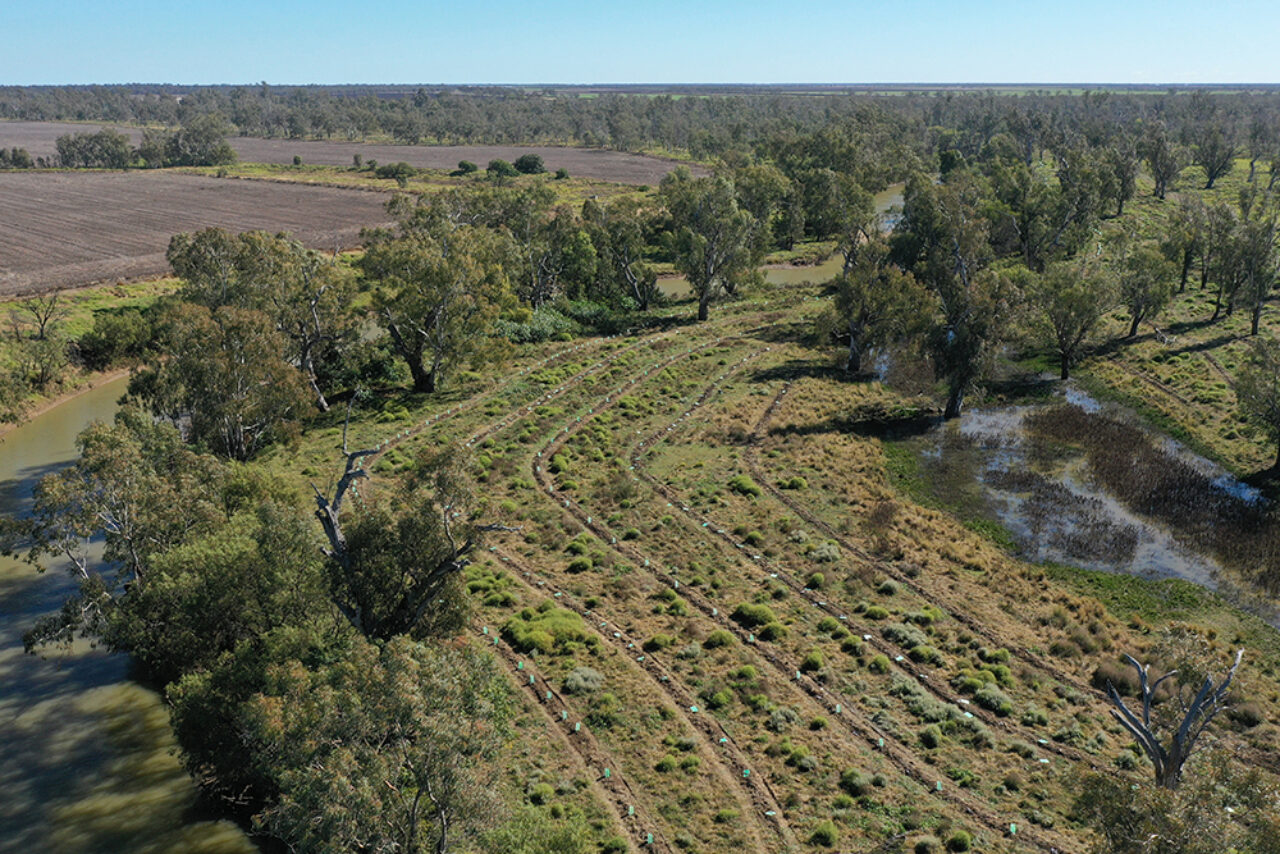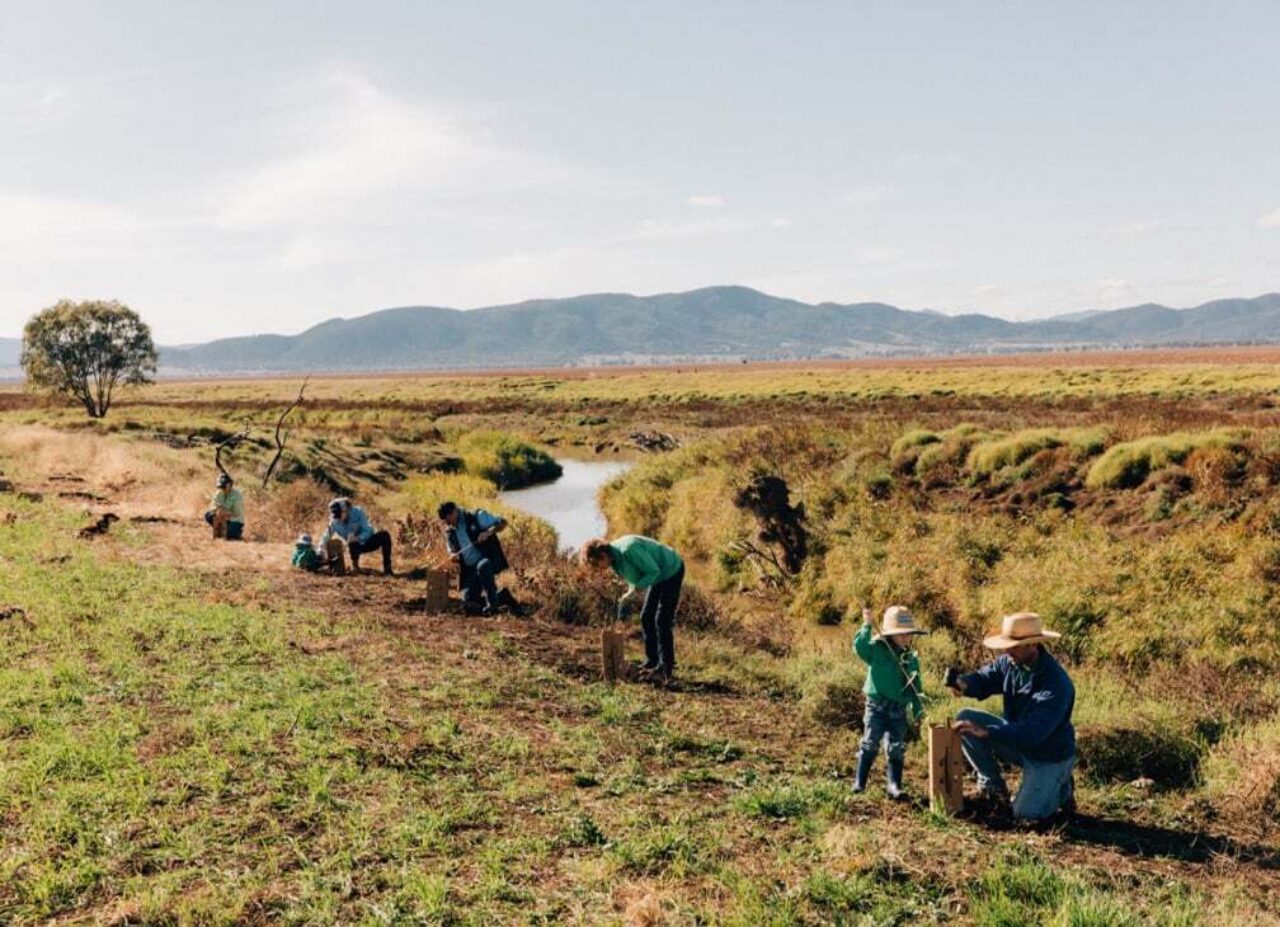Along the banks of the Namoi River in New South Wales, cotton farmers have been restoring natural habitats for wildlife in a unique project with the help of Landcare Australia and fashion brand Country Road.
Since 2020, Country Road has partnered with Landcare Australia and the Australian cotton industry in The Biodiversity Project – with a focus on enhancing and improving biodiversity on cotton farms.
More than 18,300 seedling trees have been planted, over 100 hectares of native vegetation restored and 14.4km fence lines establish to prevent livestock from entering waterways.
Sales from Country Road’s Verified Australian Cotton Heritage Sweats have supported the project, with over $1 million raised to date. The projects assist with long-term aims to protect soil health, provide habitats for native species and improve water quality across river systems on cotton farms.
Protecting and enhancing biodiversity on cotton farms is extremely important. It provides services to farmers in the form of natural pest control, erosion control, carbon sequestration and storage as well as the obvious benefits to nature itself. Healthy natural environments also provide social and recreational benefits so important in regional communities such as fishing, camping and swimming spots.

Project 1 - The Kahl family
The Kahl family from Wee Waa, NSW, were the first family to participate in the Country Road biodiversity project.
The project involved restoring 30 acres of land along the Namoi river, implemented by Landcare Australia along with the Kahl family – a cotton farming family who have lived and worked on the property for three generations. Unfortunately, flooding impacted the project, and since then the Landcare team have replanted the project to continue its positive impact on biodiversity.
“But beyond growing crops, we know that you won't farm very long unless you realise unless you look after the land it won't produce and look after you. So, it's what you must do, you need to do, to be productive as a farmer. And our industry is full of productive farmers,” Daniel Kahl says.
The project has incorporated fencing riparian zones to conserve natural landscapes and restoring about 13 hectares of river frontage along the Namoi river, planting native trees, shrubs and building fences to exclude livestock.
Project 2 – The Watson family
The Watson family from Boggabri, NSW, have a long history of biodiversity work on their farm. They have farmed in the region since 1965, with a rich past of caring for the natural landscape that was established by Andrew’s parents.
At the Watson’s farm, cotton is the families’ pillar crop, and is supported in rotation with corn, sorghum, wheat, canola and chickpeas. The Biodiversity Project has helped enhanced tree lines throughout the property, increasing natural habitat for birds, bats and insects to move from the river to linked remnant areas on the farm.
With long-term plans to continue the family’s history of planting trees on the farm, The Biodiversity Project enabled the Watson’s to bring forward their vision to revegetate the entire length of river frontage on a property they had recently purchased.

Project 3 – The Hamparsum family
Brother and sister farming duo John and Juanita Hamparsum are second generation cotton farmers continuing the work of their father, who was attracted to the rich, black soils of the Liverpool Plains and bought the property in the 1960s.
As part of The Biodiversity Project, they are revegetating 16 hectares of Mooki River area south of Gunnedah to create wildlife corridors and are also developing a fish passage in the river, enabling a variety of native fauna to traverse their habitat safely and more easily.
John and Juanita had been looking to improve our farms’ biodiversity for some time and weren’t quite sure where to start until we came across The Biodiversity Project. They immediately saw the fit for their farm and the opportunity that it presented. The recent loss of their koala population due to drought and chlamydia intensified their desire to take action to improve our farm environment for our native trees and animals.
Project 4 – The Pursehouse family
Andrew and Cynthia Pursehouse, along with their eldest son James, farm Breeza Station. Cynthia has a great love for Koalas, which were on the farm when the family first moved in 1986.
Thanks to the Country Road Biodiversity Project, the Pursehouse family have planted additional trees and repaired areas along the Mooki River, turning them into a natural habitat for the Koala population.
Andrew’s parents had a long history of planting trees on the farm, making the partnership with Country Road and Landcare Australia an easy decision to expand on the previous work at the farm. During the project, about 3000 trees were planted along several areas of the Mooki River. This section of the river naturally has very few trees along it, so the project aims to link existing remnant tree areas from a nearby hill to the river area. The Pursehouse family always had a healthy population of koalas on the farm, and over the years they noticed the koalas migrating further south, making the project aim to help that migration.
Project 5 - The Schwager family
Kevin and Mary-Ellen Schwager own Wentworth, a 550-hectare dryland farm in the Namoi Valley. Research from the Management of Biodiversity in the Cotton Landscape: Iconic and Threatened Species report, developed by CRDC with support from the Australian Government’s National Landcare Smart Farming Partnerships Initiative, identified the property as an important area for biodiversity enhancement.
As part of the Biodiversity Project, the Schwager family has planted 4,000 native seedlings across 43 hectares, restoring 2.8 km of riparian and floodplain habitat along the Namoi River.
Kevin Schwager says being involved in the project is a way for his family to contribute to both the environment and the broader community in a meaningful and responsible way.
Find out more about the project: The Biodiversity Project: Celebrating Three Years of Restoring Native Habitats - Our Stories - Country Road
